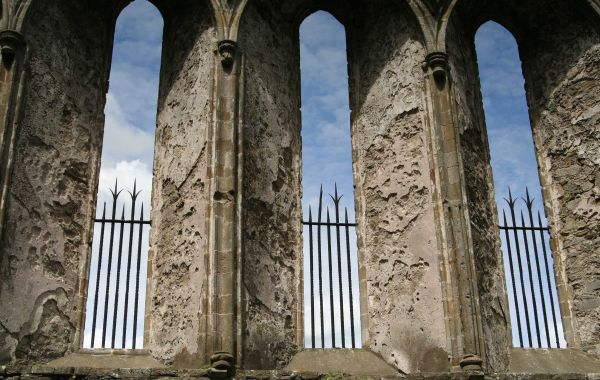Understanding Causes
From the disorderly heart of man, come the errors which corrupt the vital operation of every order necessary to human flourishing – family, education, culture, society, politics, economics, and religion. To return to order, the causes of disorder require identification and discussion. We shall look at each of these several facets of human life and outline the principal causes of disorder. Discovery of these causes will give us a starting point from which to work practically and effectively for the restoration of civilization/order.
Let our first consideration be politics, the art by which we organize ourselves to meet efficiently and effectively the fundamental needs of our common life and organize the practical affairs of living for the full development and prosperity of our human community.
Not long ago, we were confident that our trust was well placed in our elected representatives. We relied upon them to secure, by means of actions taken in accord with Judeo-Christian moral principles and the Republican principles of our constitution, the blessings of security and prosperity for ourselves and our families. Our confidence has been shaken. We have realized that the changes time has brought have resulted in moral degradation, a declining standard of living, and a loss of liberty. Politically we have passed from an age of statesmen to an age of mere politicians. How did this happen?
The spread of Modernism - the notion that Man is sufficient unto himself – having gradually but substantially eroded the practice of Judeo-Christian religions and weakened the moral character of their believers, has made those who serve in local, state and federal government much more susceptible to corruption. This circumstance, in conjunction with the increased temptations which arise in a government beset by bureaucracy, combines to pose a serious, practical threat to justice and to liberty.
The influence in politics of political action committees, corporate lobbyists, billionaire activists and globalists is undeniable. Powerful men, acutely focused on single issues which advance their individual or corporate interests, bring enormous pressure on elected representatives whose obligation is not to corporate interests and private enterprise but the civic good of their constituents. Insider trading, cronyism, material and financial perks, and blackmail constantly tempt or coerce those in elected offices.
This state of affairs did not fall from the sky, the work of an alien people. It arose gradually and steadily from incremental changes in the way mankind thought about his relationship with God and with his fellow man. The improvements he had made, by means of science and technology, to the material conditions of his existence, gradually induced a sense of increasing independence from God. Accompanying this were changes in thinking about the civic body and its governance. These changes in thinking about politics caused a movement away from monarchies and aristocracies to constitutional democracies. In America a constitutional republic arose which operated to the benefit of many while it rested on a foundation of moral virtue, civic responsibility, and faithfulness to the U. S. Constitution. As the Republic matured, it began to drift, imperceptibly, from these foundations.
The improvements brought by science and technology, however, were attended by a series of negative effects – crowded industrial cities, hazardous working conditions, long workdays and cramped living conditions. In the late nineteenth and early twentieth centuries, these negative effects provoked new thinking about the working man, labor and management, capital and profit, and raised questions about the merits of democracy as a form of government. American political thinking was changing, and the seeds of Marxism were being cast into American soil. By the early twentieth century it was putting roots down in both Europe and America. With the outbreak of WWI and the profound disillusionment which followed it, the purported benefits of socialism began to take hold of the minds of men.
In the aftermath of WWI, the U.S. government began taking an increasingly active role in attempting to alleviate societal problems, veering onto a road that would carry it further and further from the U.S. Constitution and establish a trend of adding government programs and agencies as the twentieth century unfolded.
As socialist thinking permeated universities and colleges and filtered to the public, its elected leaders came under its influence; gradually policies and legislation began to reflect this new thinking. New programs required new employees to implement them, and the federal budget swelled to support them. Taxes necessarily increased. In this way socialist thinking gradually brought forth many initiatives, policies, programs – even agencies – which have no basis in the Constitution. These have become an insupportable burden, infringing the rights of state governments, reducing freedom of action, and impoverishing the middle class.
The errors and evils of socialist thinking have gained currency, however, not simply because academia has vigorously promoted them but because of an inattentive and complacent citizenry. Too many citizens, scandalized by political machinations or otherwise made indifferent to the political process, detached themselves from basic civic obligations without considering the long-term consequences of such acquiescence. This, taken together with the failure of public schools to teach civics, the U.S. Constitution, and American history has resulted in a second generation of students who are ignorant of the fundamentals of our government and who lack a patriotism which would ordinarily be fostered by a thorough education in American history, and the history of the Republic.
Solutions
Our Republic can and will survive its current perils if we recall a fundamental truth about American democracy: the active participation of the ordinary citizen in political affairs is essential to freedom; essential not optional. The administrative state has arisen, in part, because insufficient scrutiny was given to the conduct of our elected representatives. Today, more and more citizens are realizing this and changing their attitude and behavior toward politics. An active citizen, at the very least, knows who his representatives are and their positions on vital issues; he keeps their contact information in his phone directory and communicates frequently via text, voice, or email expressing both his disapproval of flawed legislation and his support for sound legislation. He votes in every election. Congressmen at both the state and federal level are aware that they are dependent upon their constituents for their offices – the source of their status, power and influence. An active public which communicates frequently with its representatives reminds the officer to whom he is beholden.
In addition, the active citizen will seek out others who are aware of the perils of the Republic and join or form organizations which can bring concentrated attention upon elected officials. He knows that his efforts are more likely to be effective when working cooperatively and draws strength from working for freedom in the company of others. He will avoid re-inventing the wheel, knowing there are often existing organizations which would delight in incorporating another member. The effects of even a small but organized group is not to be underestimated. Strength lies in numbers.
For the sake of the Republic, every citizen must now ask: should I consider running for a local, state or federal office? Everyone has responsibilities – family, job, church; with freedom at stake, these can no longer keep us from public service. The young must be especially encouraged. They are to be sought, found, encouraged and supported. The wisdom once brought by senior members of Congress is no longer in evidence and their experience has become a liability rather than a benefit. Now, each of us must ask: should I run for public office?
If the Republic is to be preserved, it will be preserved by true lovers of freedom. Let each of us be active and attentive, in his own circumstances, to what can and must be done to preserve our freedom. Let everything be done prayerfully, conscientiously, and courageously.








